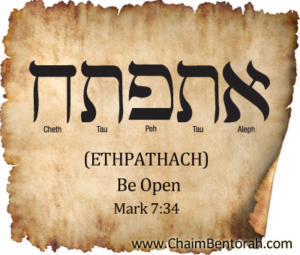Aramaic Word Study – Be Open – Ethpathach Aleph Taw Pei Taw Cheth
Mark 7:34: “And looking up to heaven, he sighed, and saith unto him, Ephphatha, that is, Be opened.”
 It is curious that if the New Testament was written in Greek, why do we have so many words which are merely transliteration directly from the Aramaic into the Greek. There are over two hundred Aramaic words occurring in the Greek New Testament. Such words as raca, mamon, corbon, maranatha and gehennah to name a few are just simply transliterated into the Greek. Most all Biblical scholars acknowledge that Jesus and His disciple spoke Aramaic, the question is if the inspired text of the New Testament was really Greek then why are there so many Aramaic words not translated into the Greek to be translated from the Greek to the English. I have discussed this problem at length in other studies. Ethpatach is a clear example of an Aramaic word transliterated into the Greek and then further transliterated into the English. Was it that hard to express the words “be open” in the Greek?
It is curious that if the New Testament was written in Greek, why do we have so many words which are merely transliteration directly from the Aramaic into the Greek. There are over two hundred Aramaic words occurring in the Greek New Testament. Such words as raca, mamon, corbon, maranatha and gehennah to name a few are just simply transliterated into the Greek. Most all Biblical scholars acknowledge that Jesus and His disciple spoke Aramaic, the question is if the inspired text of the New Testament was really Greek then why are there so many Aramaic words not translated into the Greek to be translated from the Greek to the English. I have discussed this problem at length in other studies. Ethpatach is a clear example of an Aramaic word transliterated into the Greek and then further transliterated into the English. Was it that hard to express the words “be open” in the Greek?
Some commentators feel that Mark just wanted to give the “wonderful words” just as Jesus spoke them. Others will say it is to preserve the power behind the words, whatever that means. In many cases commentators will admit that these Aramaic words were just untranslatable or unexplainable in the Greek. An example is the words of Jesus on the cross: “Eli, Eli Lama Sabachthani.” Not everyone understood what Jesus was saying, some said he was calling for Elijah. The confusion was not that they could not hear what Jesus was saying but that he was speaking in a Northern dialect of Aramaic, an Old Galilean dialect and the word sabachthani was not familiar to those speaking the Southern dialect. The one’s transcribing the words into Greek were likely not sure what Jesus was saying so they just used the exact words in Aramaic and then wrote after that their personal interpretation of those words: “My God, My God why hast thou forsaken me.” Many language scholars now believe Jesus was not saying forsaken but this is why I have been kept or this is my destiny. Since they were unsure of the correct translation they gave the actual words as they were spoken. Sometimes there are multiple ways a word could translate from the Aramaic and the scribe would give the actual Aramaic word to allow the reader to decide which translation would be correct. For instance in Mark 5:41: “Taking her by the hand, Jesus said, “Talitha koum!” which means, “Little girl, I say to you, get up!” In the other Gospels, this account suggests that the young girl’s name was Talitha or Tabitha. Tabitha would be the Southern Aramaic dialect and Talitha would be the Old Galilean Northern dialect. However, in the North dialect, Talitha could very well have not been a proper name. It might just mean little girl or little wounded lamb. The Aramaic word koum means to get up or arise. Hence the scribe writing the account from Mark was in doubt as to the literal translation of Talitha koum and simply transliterated it into the Greek and then gave his own interpretation “little girl, arise” which made its way into King James English as “Little girl, I say to you arise.”
So, this brings us to the question of why were the words “be open” retained in the original Aramaic. The word for “be open” is ethpathach which in the Aramaic comes from the root word pathach which means to be open or to begin. It is also used for menstruation where the endometrium is renewed so that it is in a suitable state to ensure the implantation of a fertilized egg. In other words, it is the first step to pregnancy, a beginning to something that could be followed by something even greater.
Matthew 7:34 gives the account of Jesus healing the deaf-mute. In the Aramaic dialect of the people in Southern Judea the word ethpathach was commonly used by someone who had normal exceptional hearing as opposed to someone who was hard of hearing or deaf. We see this in the Talmud in Yabamot 114b. However, in Talmudic Aramaic, the word ethpathach also expresses the idea of a beginning and/or menstruation. The scribe translating the words of Jesus may have hesitated to simply say “be open” as he felt there was a deeper meaning to the word ethpathach so he presented the Aramaic word for the reader to ponder a deeper meaning being expressed to the deaf man.
Stop and ask yourself, who or what was Jesus addressing when he said: “Be open?” Was it the deaf man and the first words he heard were “Be open?” But the man could not hear. Was Jesus speaking to deafness? Is deafness able to hear and understand? I am sure the scribe was thinking about this conundrum when he decided to just keep the Aramaic word open to private interpretation. Jesus could have been speaking to the deaf man the moment his hearing returned. The man likely lost his hearing at a very early stage in his life and did retain some understanding of the spoken language. At least enough to begin speaking again and to understand the word ethpathach to mean a beginning. Jesus was communicating to this formerly deaf man, this is just the beginning of something even greater. He would become a talking/speaking testimony to the power of Jesus Christ and would spend the remainder of his life sharing this experience.
The lesson here is that many people cry out to God for a miracle, a healing, a financial blessing, or some other intervention in their life that can only come through some supernatural means. If you seek such a miracle, you must remember that there is a natural condition that comes with the miracle. You have been touched by the supernatural and your awareness of the reality of the supernatural and a supernatural God is going to force you to make a decision. That decision is to either acknowledge the existence of a loving God and submit your life to Him or outright reject Him. Not only will your life change due to the miracle but it will also mean you have an obligation to use this miracle to share with others the reality of the love of God. As one person who experienced a miracle in his life put it, he had to “face up with a miracle.”
Please leave your thoughts and comments below. Chaim doesn’t get to see the email replied to from here. We do appreciate and enjoy reading all comments and Chaim will get to see them here.
Hi there! Thank you for reading this Daily Word Study. Can I ask a favor? Share this Daily Word Study with your friends on Facebook and Twitter by clicking one of the icons below.
Thanks & Blessings, it means a lot to me!








The One who spoke to the wind and calmed the seas…does the wind have ears to hear? Yet all Creation submits to His Authority which He has given us. I always wanted to know more about submitting under authority. Yes, we listen and do what’s said but what role is the heart to play; the ears; eyes? The Centurion who begged Jesus to ‘speak the word only’ from a distance was pleading and submitting with great understanding and found to have ‘great’ faith.
Shalom Chaim, what an excellent meditation this morning!!! Thank you for “opening up” the window,(word) and for giving us a clean and fresh breath of air into the words in our Bible. I will meditate on this for a while…
Reading this was a divine appointment for me. I don’t regularly have time to read these posts but always find them enlightening when I do. But today, reading those words of Jesus on the cross with Chaim’s comment that He could have said this is my destiny rather than the typical translation as a cry of the Father’s abandonment makes so much sense to me. If the Son is God taking on humanity at the incarnation, He could not be separated from the Father. They are two Persons of the Trinitarian God and are eternally one. Thank you, Chaim Bentorah, for that valuable enlightenment!
It is true that there is enormous resistance to witness and proclaim to the world the goodness and mercy of God, the absolute wonders that He has done.
For me it required a deep inner resolve to step up and declare the magnificence of my Father and God. To live intentionally in this context